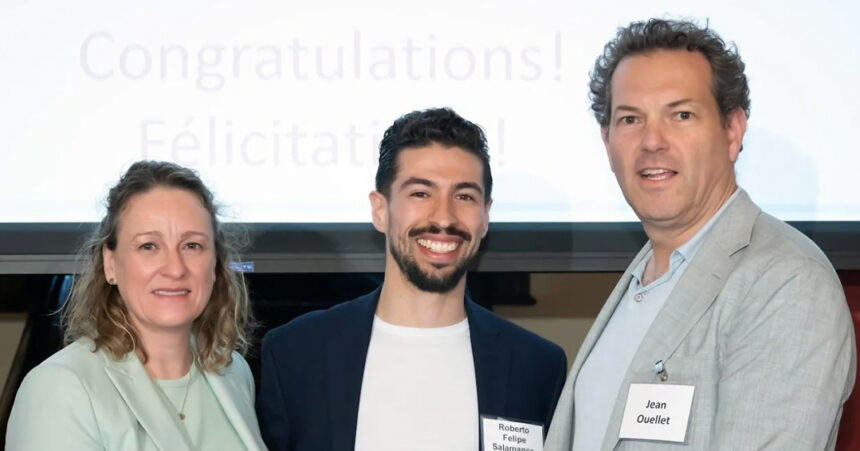The recent McGill University Clinical Innovation Competition (CLIC) has once again highlighted Montreal’s flourishing health technology ecosystem, with several promising startups securing crucial funding and mentorship opportunities that could reshape patient care in Quebec and beyond.
Standing in the elegant atrium of McGill’s Life Sciences Complex last week, I watched as Dr. Jake Barralet, Director of Innovation at the Faculty of Medicine, announced this year’s winners to enthusiastic applause from a crowd of healthcare professionals, investors, and fellow entrepreneurs.
“What we’re witnessing today represents the fusion of Montreal’s academic excellence with our entrepreneurial spirit,” Dr. Barralet told me after the ceremony. “These innovations address real clinical needs identified by those working directly with patients.”
The Hakim Family Innovation Prize, CLIC’s top honor worth $70,000, went to NovoBiome, a startup developing treatments for metabolic diseases through gut microbiome manipulation. Their approach targets the fundamental biological mechanisms behind conditions affecting thousands of Montrealers.
“We’ve been working for three years to reach this point,” said Dr. Marie Lavoie, NovoBiome’s co-founder, her voice reflecting both exhaustion and excitement. “This funding allows us to accelerate our clinical validation process while staying rooted in Montreal’s biotech community.”
The competition, now in its eighth year, attracted nearly 40 applications from early-stage companies tackling healthcare challenges from cancer diagnostics to mental health support tools. What makes CLIC particularly valuable is its connection to McGill’s extensive healthcare network, providing winners with not just funding but access to clinical testing environments across Montreal’s teaching hospitals.
The Marika Roy Innovation Prize ($30,000) recognized Pulmonary Analytics, whose AI-powered software helps detect early signs of respiratory decline in hospitalized patients. With Montreal’s aging population, such technologies could significantly reduce the burden on our healthcare system while improving outcomes.
“Our algorithm was developed using data from Montreal’s diverse patient population,” explained Pulmonary Analytics co-founder Dr. Samuel Tremblay. “This gives us confidence it will work effectively across different demographics and healthcare settings.”
The vibrant health technology sector emerging in Montreal reflects our city’s unique advantages – world-class research institutions, a diverse multilingual workforce, and government support for innovation. According to Montreal International, healthcare and life sciences startups attracted over $220 million in venture capital last year, positioning our city as an increasingly important player in North America’s biotech landscape.
Walking through the innovation showcase that accompanied the awards ceremony, I spoke with Philippe Dubuc from Investissement Québec, who noted the distinctive character of Montreal’s health tech scene.
“What’s exciting about Montreal’s ecosystem is how these startups combine cutting-edge science with practical solutions,” Dubuc said. “They’re not developing technology for technology’s sake – they’re addressing concrete healthcare challenges we face in Quebec.”
Indeed, many of the competing startups were born directly from clinical observations. NeuraSense, which received the MI4 Innovation Prize ($10,000), developed their portable neurological assessment tool after co-founder Dr. Caroline Morin witnessed patients from northern Quebec communities traveling hours for basic neurological evaluations that could potentially be performed remotely.
“Growing up in Saguenay, I saw firsthand how geography creates healthcare disparities,” Dr. Morin shared. “Our technology isn’t just about efficiency – it’s about equity of access.”
What struck me most while speaking with these founders was their deep connection to Montreal’s healthcare realities. Many maintain clinical practices alongside their entrepreneurial ventures, giving them nuanced insights into the everyday challenges facing both patients and providers in our healthcare system.
The CLIC competition itself has evolved to reflect this practical focus. Beyond financial awards, winners receive mentorship from experienced healthcare entrepreneurs and introductions to potential clinical partners across Montreal’s hospital network. This support ecosystem has helped previous winners like Aifred Health and My Intelligent Machines secure additional funding and expand operations while remaining headquartered in Montreal.
“We’re building more than individual companies,” explained Dr. Barralet. “We’re developing a health innovation community that retains talent in Quebec and positions Montreal as a global leader in medical technology development.”
For Montrealers, these innovations promise tangible benefits. NovoBiome’s treatments could offer new options for the estimated 15% of local adults living with metabolic syndrome. Pulmonary Analytics could help our strained hospital system more efficiently allocate resources while improving patient safety. NeuraSense could reduce travel burdens for patients from regions like Abitibi and Côte-Nord who currently must visit specialist clinics in Montreal.
As I left the event, a light spring rain falling on Pine Avenue, I reflected on how these technologies embody something distinctly Montreal – practical innovation shaped by our city’s bilingual character, cultural diversity, and pragmatic approach to problem-solving.
The CLIC competition represents more than just a funding opportunity; it’s becoming an important annual milestone for our city’s growing health technology ecosystem. For Montrealers interested in this sector’s development, McGill’s Faculty of Medicine hosts several public events throughout the year showcasing these innovations before they reach market.
With continued support from institutions like McGill, funding organizations, and government initiatives, Montreal’s health tech startups are increasingly well-positioned to address healthcare challenges while creating high-value jobs and economic growth for our city. The future of healthcare innovation in Quebec looks promising indeed – and it’s taking shape right here in the labs, hospitals, and startup incubators across Montreal.







